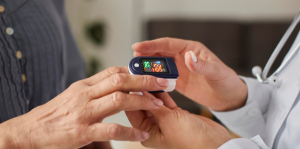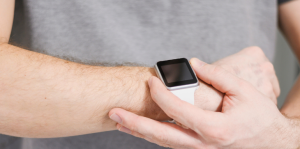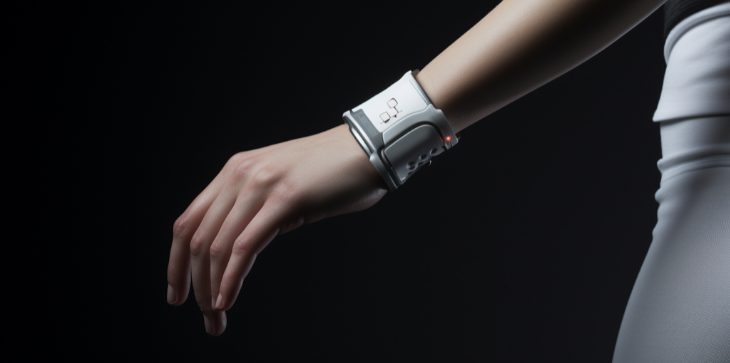The Evolution of Wearable Health Technology
Wearable health tech has come a long way since the days of basic pedometers and heart rate monitors. Modern devices leverage cutting-edge advancements in artificial intelligence (AI), the Internet of Things (IoT), and biosensor technology to provide real-time insights, predictive analytics, and even early disease detection.
The Early Days: Fitness Trackers and Basic Health Monitoring
The journey began with simple step counters and heart rate monitors that encouraged users to stay active. Devices like the Fitbit and Nike FuelBand sparked a movement toward digital health awareness, allowing individuals to track their physical activity and set fitness goals.
The Rise of Smartwatches: Beyond Fitness Tracking

The introduction of smartwatches, such as the Apple Watch and Samsung Galaxy Watch, revolutionized wearable health tech. No longer limited to counting steps, these devices now feature ECG monitoring, blood oxygen measurement, sleep analysis, and even fall detection. Some models are equipped with emergency alert systems that can notify contacts and healthcare providers in case of health emergencies, offering an unprecedented level of personal safety.
Breakthrough Innovations in Wearable Health Tech
From continuous glucose monitoring to AI-driven diagnostics, the latest innovations in wearable health technology are setting new standards for personal healthcare. Here are some of the most groundbreaking developments:
1. Continuous Glucose Monitoring (CGM)

Wearable CGM devices like the Dexcom G6 and FreeStyle Libre have revolutionized diabetes management. These devices provide real-time blood sugar monitoring without the need for frequent finger pricks, transmitting data to a smartphone for easy tracking. By offering actionable insights, CGMs empower users to make informed decisions about diet, exercise, and medication.
2. Wearable ECG and Cardiac Monitoring

With ECG functionality now integrated into devices like the Apple Watch and Withings ScanWatch, users can detect irregular heart rhythms, such as atrial fibrillation (AFib), in real time. These wearables provide early warnings of potential cardiovascular issues, allowing users to seek medical attention before conditions escalate.
3. Smart Rings and Biosensors
While smartwatches dominate the market, smart rings like the Oura Ring are gaining traction for their discreet yet powerful health-tracking capabilities. These rings monitor heart rate variability, body temperature, and sleep cycles, providing users with personalized health insights. Additionally, biosensors such as the BioButton offer continuous monitoring, detecting early signs of infections and chronic conditions.
4. Blood Pressure Monitoring on the Go
Traditional blood pressure monitors are being replaced by wearable alternatives like the Omron HeartGuide, which provides real-time blood pressure readings throughout the day. These devices help users track hypertension trends, enabling early detection and better cardiovascular management.
5. Smart Contact Lenses: A Game-Changer in Health Monitoring

Tech giants like Google and Mojo Vision are developing smart contact lenses embedded with biosensors capable of measuring glucose levels, intraocular pressure, and hydration status. These lenses could revolutionize non-invasive health monitoring, particularly for diabetics and individuals with eye conditions.
Transforming Healthcare with Wearable Technology
Wearable health technology is not just about individual convenience—it’s reshaping the entire healthcare landscape by enhancing preventive care, enabling remote patient monitoring, and improving chronic disease management.
A New Era of Preventive Healthcare
By continuously tracking vital signs and detecting anomalies early, wearable health tech helps prevent diseases before they escalate. Conditions such as hypertension, diabetes, and cardiovascular disorders can be identified and managed proactively, reducing hospital admissions and healthcare costs.
Remote Patient Monitoring: The Future of Healthcare Delivery
Wearables are playing a crucial role in telemedicine and remote patient monitoring. For individuals with chronic illnesses or limited access to healthcare facilities, these devices allow medical professionals to track patient health in real time, ensuring timely interventions and reducing the need for frequent hospital visits.
Empowering Patients with Chronic Conditions
For those living with chronic diseases, wearable health devices provide invaluable support. Diabetics can track glucose fluctuations, heart patients can monitor their heart rhythms, and individuals with hypertension can receive real-time blood pressure alerts. By placing health management directly in the hands of users, these innovations promote proactive self-care and improve overall quality of life.
Challenges and the Road Ahead
Despite its rapid advancement, wearable health technology faces several challenges, including data privacy concerns, accuracy issues, and regulatory hurdles. However, with continued innovation, the future of wearable tech holds exciting possibilities.
Tackling Data Security and Privacy Concerns
As wearable devices collect vast amounts of sensitive health data, ensuring robust security measures is paramount. Tech companies must implement advanced encryption protocols and comply with data protection regulations such as GDPR and HIPAA to maintain user trust.
Enhancing Accuracy and Reliability
The effectiveness of wearable health tech hinges on data accuracy. Inaccurate readings could lead to misdiagnosis or unnecessary medical concerns. As sensor technology and AI algorithms improve, wearables will become more precise and reliable in delivering health insights.
What’s Next? The Future of Wearable Health Tech
The next wave of innovation will see the emergence of smart tattoos, bio-integrated sensors, and even nanorobots capable of monitoring health at the cellular level. These advancements will take healthcare beyond the wrist and into seamless, body-integrated solutions, offering real-time, effortless health tracking.
Wearable health technology is redefining how we monitor and manage our well-being. With advancements in AI, IoT, and biosensors, these devices are not only enhancing personal health but also transforming the broader healthcare ecosystem. From preventive healthcare to remote patient monitoring, the impact of wearables is undeniable. As the technology evolves, the future of healthcare will be more proactive, data-driven, and seamlessly integrated into our daily lives





